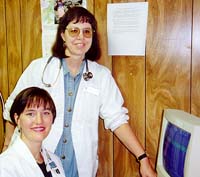Lowcountry nurse embodies role of caregiver, teacher
by Cindy A. AbolePublic Relations
 Nursing
preceptor Sharon Shealy, right, works alongside graduate nursing student
Kelly Lawler and other health professionals at the Harrison Peeples Health
Care Center in Varnville.
Nursing
preceptor Sharon Shealy, right, works alongside graduate nursing student
Kelly Lawler and other health professionals at the Harrison Peeples Health
Care Center in Varnville.
For more than 20 years, Sharon Shealy has been in the business of caring for people.
Even today, it isn't hard for her to open her arms and her heart as a caregiver and teacher when it comes to providing health care to some of South Carolina's poorest communities.
Shealy is a family nurse practitioner working out of the Harrison L. Peeples Health Care Center in Varnville. She sees and treats people living within a 40-mile radius just west of Beaufort, providing primary care and community education to individuals diagnosed with some of the state's most chronic health diseases—hypertension and diabetes.
Rotating in three clinics located in the rural communities of Estill, Yemassee and Varnville, Shealy has built strong ties in the area. These relationships are not just with her many patients, but with a handful of physicians, pharmacists, physician assistants, nurses and other health professionals who also serve those communities.
“Many students have a preconceived idea of how other interdisciplinary professions work,” said Shealy, commenting about students working in rural areas. “Now they have a chance to see for themselves the advantages of interdisciplinary teamwork in treating patients and feel better about it.”
Shealy has worked as a clinical preceptor for students in the College of Nursing since 1996. One of 40 preceptors with the college, she spends her time working with nurses in the family practice rotations and with the Family Nurse Practitioner (FNP) Rural Health Fellowship in Primary Health Care. The fellowship, which trains graduate nursing students within rural settings, is managed by principal investigator Elizabeth A. Erkel, Ph.D., R.N., and associate professor.
“Sharon goes above and beyond her duties as a clinical preceptor,” Erkel said. “She has been instrumental in helping our fellows serve a community by identifying and locating community resources and brainstorming ideas for their scholarly products.”
South Carolina ranks among the nation's highest when it comes to lack of access to primary health care. In rural areas, residents are at a higher risk for chronic illness, accidents, adolescent pregnancy, infant mortality and communicable disease. The presence of family nurse practitioners can assist people from low income backgrounds who are elderly, undereducated and underinsured.
Within a three-year period, the fellowship allows eight FNP students to work within rural practice environments throughout the state. Working under the supervision of a preceptor, the fellows work for two years within a rural health center.
“The experience has helped to instill my love for rural health care,” said Paige French, R.N., FNP, one of two fellows who have worked with Shealy. “Working within a community has really made a difference to me. I'm now able to recognize that there are many other barriers besides costs that can affect how a patient can get something as simple as a prescription filled.”
It's not unusual for FNP students to make the long 65-mile commute between Charleston and the Varnville areas throughout the week. Students may stay at the Lowcountry Area Health Education Consortium's (AHEC) Hampton House or make other private accommodations. Throughout the year, Hampton House hosts other MUSC students assigned to work clerkships and support other rural health programs in that area of the state.
As part of the fellowship, French and fellow student Vickie Reynolds, were tasked to complete a scholarly product focusing on major health problems experienced by residents in Hampton County. Both approached Shealy, an expert on diabetes management, and prepared a grant application promoting a diabetes management day. The event focuses on an interdisciplinary approach to providing primary care and referral to services and specialists within the Hampton County area. Once established, the program could serve residents in surrounding sites.
“Within rural health care, you learn to depend on others for supplementing care,” said French, confirming the many successful working relationships she's developed with health care teams and patients. “We learned to access resources by networking with people throughout the county to gather information or learn about any services that would lead to a patient's ultimate care goals.”
“I've been able to do a lot of one-on-one work with students,” Shealy said. “It's been the best experience I've had as a nurse practitioner. Working with students usually means that there's always room for surprises. It's helped me to stay on my toes. They're usually enthusiastic, ready and well-prepared.”
“The experience provided me with ‘real world’ exposure,” French said. “Students seemed surprised by the needs of these people—their complexity of care because of diabetes and other diseases. Problems reach a lot farther for these people. They struggle through other difficulties like economic barriers, illiteracy and mostly, lack of resources.”
Shealy, who has always enjoyed the easiness of the country life, is a Chattanooga native. She received an associate degree in nursing from Florida Junior College in 1976.
She went on to earn her BSN from the University of South Carolina-Spartanburg in 1982.
In 1994, she graduated from USC-Columbia's nurse practitioner program and relocated to nearby Hampton with her husband, Peeples Center medical director Neal L. Shealy, M.D., and their two sons.